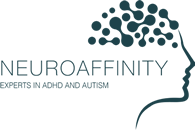Autism FAQs
What is the purpose of an autism assessment?
An autism assessment aims to identify whether an individual meets the criteria for Autism. It provides clarity, enabling access to appropriate interventions, support, and accommodations to improve quality of life.
Who do we treat?
At Neuroaffinity, we assess children over 6 years of age, adolescents, and adults.
Who can benefit from an autism assessment?
Anyone experiencing challenges related to social interaction, communication, or behaviours commonly associated with Autism can benefit from an assessment. This includes both children and adults, as Autism can be diagnosed at any age.
Can autism be diagnosed in adults?
Absolutely. Many individuals are diagnosed with autism in adulthood. An adult diagnosis can provide valuable insights into lifelong experiences and enable access to tailored support and resources.
Do I need a referral?
No referral is necessary. You can simply book an Autism assessment directly with one of our Autism Specialist Clinicians through our website or by calling our friendly admin team who will arrange this for you.
Who does the Autism assessment?
All of our Autism evaluations are performed by clinicians who are registered with either the NMC (Nursing and Midwifery Council), Health and Care Professions Council (HCPC) or the GPhC (General Pharmaceutical Council). Complex cases are reviewed and discussed in our monthly MDT (Multi-Disciplinary Team) meetings, which are chaired by a psychiatrist registered with the GMC (General Medical Council).
How does the assessment take place?
The assessment is conducted via an online video consultation. Alternatively, if necessary, face-to-face appointments can be scheduled at our clinic. Follow-up appointments will be conducted through a telephone call or video consultation.
How long does the assessment appointment take?
The length of an Autism assessment can vary based on the individual and the specific assessment procedures involved. Typically, it may last up to 3 hours and often involves multiple sessions spread over several weeks to ensure thoroughness and accuracy.
What tools do you use for diagnosing autism?
At Neuroaffinity, we use evidence-based tools such as the Autism Diagnostic Observation Schedule, Second Edition (ADOS-2), which is recognised as the gold standard in autism diagnosis.
Is the assessment process confidential?
Yes, all aspects of the assessment process at Neuroaffinity are conducted in strict confidence. We are committed to safeguarding your privacy and ensuring that all information is handled securely.
What happens after the assessment?
Within 7 working days of your Autism feedback appointment, you will receive a written report by email. This report will include the clinical diagnosis and, if applicable, a proposed treatment plan.
When will I know the outcome of the assessment?
The results of the assessment will be reviewed during the feedback consultation. A positive Autism diagnosis is granted only if the information provided during the assessment aligns with the criteria defined by the DSM-5. Please be aware that we cannot provide a refund if the assessment outcome differs from what was anticipated.
What is your cancellation policy?
Please reach out to us as soon as possible if you wish to cancel an appointment. Cancellations made with less than 48 hours' notice, but more than 24 hours' notice are typically charged at half price. Unfortunately, cancellations with less than 24 hours' notice or non-attended appointments without prior notice will incur the full fee.
Do You Need Urgent Help?
Unfortunately, one of the things we cannot do is provide help in an emergency. However, if you feel that you can no longer cope or feel out of control in your situation, it's important to know that help is available. Immediate expert assessment is crucial to identify the best course of action and to prevent matters from worsening. If you are not already in touch with local mental health services, the Samaritans offer a confidential service that you can reach 24 hours a day, 365 days a year. You can call them at 116 123.
For urgent non-life-threatening mental health care, please call 111 (NHS 111 Service). To find the contact number for your local mental health crisis team, you can use the following link: NHS Mental Health Crisis Services.
CONTACT US TODAY
Connect with qualified specialists through our quick and streamlined online or face to face assessment process.
Experience the perfect blend of expertise and convenience.











